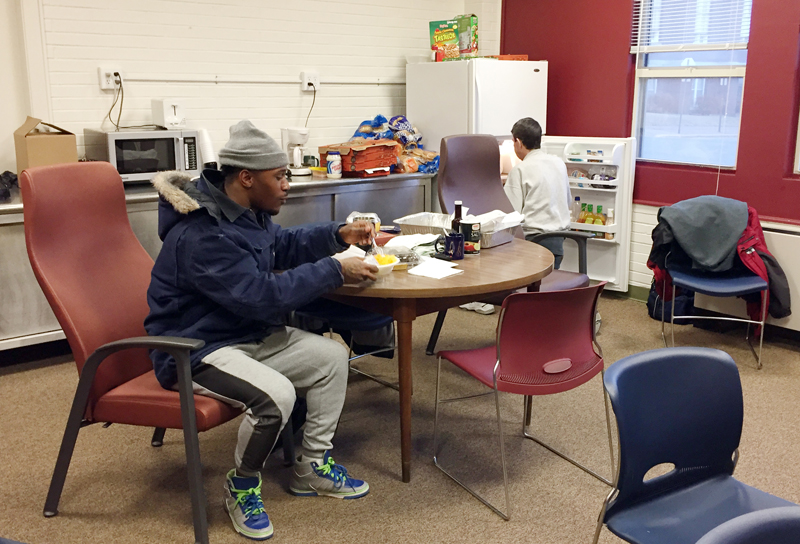(Editor’s Note: Nearly 13,000 people experienced homelessness in Iowa in 2015, according to the Institute for Community Alliances. The Catholic Messenger is exploring the issue of homelessness in a series that began Feb. 9. We’ll share stories of people who are homeless, talk with people and agencies responding to homelessness, and offer suggestions for alleviating challenges that cause homelessness.)
By Barb Arland-Fye
The Catholic Messenger
MUSCATINE — Charla Schafer shares stories of success as she takes a visitor on a tour of the Muscatine Center for Social Action (MCSA). The center, which she leads, provides emergency and temporary shelter, basic health care, educational and support services for those in need in Muscatine County. MCSA provides the only homeless shelter in Muscatine; last year, it served 227 adults and children dealing with a housing gap.

Muscatine Center for Social Action (MCSA) in Muscatine provides a day room for single men who are experiencing homelessness. They sleep in the center’s gym, which is used for recreational activities during the day. Families and single women have their own shelter space at MCSA.
Schafer recalls the story of a family of five: an employed mother with three children in school and a toddler. “The landlord was not addressing mold in the rental they lived in. It was creating health issues for the children. This mother was able to sustain the family monthly, but was vulnerable to unexpected expenses — so she couldn’t afford the extra costs of moving.”
“The family moved into a family room at MCSA and stayed for a month. During this time the mother was able to save money. She was offered off-site permanent supportive housing provided via a partnership between MCSA and a local church. She didn’t have to pay a deposit, just monthly rent. While she was at MCSA, we supported her in her focus of identifying housing options, budgeting, and paying off utilities. We provided a basket with items her family needed as she moved out.”
Russell Kulp is another MCSA success story. He sought help at MCSA twice in the 1990s while struggling with alcoholism. “All together, I was here about seven years as a guest,” says Kulp, now an MCSA employee working in residential support. He accepted the job 12 years ago, after earning a bachelor’s degree in business management.
“I mainly take care of residents; ask what their needs are, or whether they need someone to talk to. My actual duties include almost everything in the building,” he explained. He ensures everything in the building is operating smoothly and keeps track of supplies. He helps watch the front desk, answer phones and prepare supper. What he appreciates most about MCSA is “the simple fact that it’s here for the poor and homeless … if they need a place to stay, they can stay here. I’m doing God’s work here.”
MCSA celebrated its 25th anniversary last year. It began as a stop-gap measure by a group of private citizens determined to keep dorm-style rooms on the second floor of the YMCA available for single men in need. The mission evolved to improving the lives of Muscatine citizens by addressing unmet needs such as housing and poverty, family violence, and barriers to service availability.
The mission was fine-tuned in 2005 to help Muscatine-area homeless get back on their feet through the expansion of case management, along with a focus on skill development and personal responsibility. Additional services were added: Muscatine Pediatric Dental Clinic, Vision Care Clinic, and behavioral services to address basic, unmet needs. In 2014, the Muscatine Domestic Violence Shelter came under the umbrella of MCSA.
Schafer describes MCSA as “a critical component in our community’s ability to provide outreach and humanity for families and individuals in crisis: meeting the immediate needs as well as building an infrastructure of skills, confidence and resources for the future. When someone arrives at the shelter something is blocking the individual or family from being self-sustaining. It may be a job; it may be a connection to a resource. We want to give people the opportunity and time to address each area.”
While the building that MCSA occupies no longer resembles a YMCA, some vestiges of its former life remain. The gym serves as a makeshift emergency dorm for single men. Each is assigned a numbered spot along the wall. “We can accommodate 42,” Schafer said. Their foam mattresses and bedding are stored in a closet in the gym. The men pull out the bedding each night, make the beds and return them to the closet the next morning. They stay an average of 20 days, work with a caseworker and do chores.
Inside MCSA’s homey Transitional Family and Individual Housing area, Schafer greets a woman keeping an eye on two toddlers playing on a colorful rug in front of her. Across the room are doorways to eight apartments, each with a roof decoration overhead to give the appearance of a home. Guests share a large open living space, kitchenette, bathroom and laundry. An average stay is approximately 45 days so that individuals can work toward self-set goals. “Our job is to determine how we can support that person (or family) in their individual needs,” Schafer said.
MCSA also provides 35 units of on-site permanent supportive rental units and 16 units of off-site permanent supportive housing, Schafer said. The Homeless Prevention program is another important component of MCSA; the Domestic Violence shelter serves survivors of domestic violence off-site.
Collaboration with the greater community is essential. “The success of the program’s guests is thanks to the diversified financial generosity of individuals, faith and business communities, Muscatine County, United Way, local trusts, grants, and other contributors,” Schafer said. “Our largest funding source is the income received from our rental units.”
“The services offered at MCSA really enable an individual to develop and refine their life skills so that they can grow as individuals,” said Cory Garvin, vice president of MCSA’s Board of Directors. “My hope is that through these opportunities each person will be able to create a satisfying and meaningful life.”
His number one goal is “to put ourselves out of business. Wouldn’t it be awesome if we could help everyone so that our shelter would no longer be needed?”
Meanwhile, securing funding for the homeless shelter and its affiliated programs becomes more challenging each year. “We’re not the only great cause,” Garvin said. But, he believes God’s hands guide the work and leadership of MCSA.
Boots at home at MCSA
MUSCATINE — Each child who stays at Muscatine Center for Social Action (MCSA) receives a soft-cover story book titled “Boots at Home at MCSA” and a small, soft black blanket with white spots. The gift provides a comforting touch to a child’s stay in MCSA’s family shelter, which provides a temporary home for persons who have become homeless for any reason.
 “Boots” the talking cat is the story’s protagonist and is named for the resident cat at MCSA. The fictional Boots gives a tour of MCSA to a young boy who has just entered the family shelter with his mother. Readers follow the boy through the center and learn about the daily routine and all of the things available to help children and their parents.
“Boots” the talking cat is the story’s protagonist and is named for the resident cat at MCSA. The fictional Boots gives a tour of MCSA to a young boy who has just entered the family shelter with his mother. Readers follow the boy through the center and learn about the daily routine and all of the things available to help children and their parents.
Midway through the story, we read, “I know you might be a little sad at first,” said Boots, “but it’s like one big family here. There are other kids here, too. Everyone helps each other.”
Author Becky Whitmore is an MCSA volunteer who teaches weekly classes to those staying at the shelter. Illustrator Chris Anderson stayed at MCSA when he experienced a short-term gap in housing. During that time, he met Becky and began collaborating on the book. He dedicated his work to his daughter, Chiara. Others who worked on the project were Shalini Raichur, Bonnie Nichols and Charla Schafer.
Causes of homelessness
“Over the last several years the percent of first time homeless has been steadily increasing. The face of homelessness is changing,” states the Institute for Community Alliances in its Annual Snapshot 2015 report of service and shelter use in Iowa. “As the economy recovers, more and more people experiencing instability are experiencing it for the first time, but more briefly and in a way that seems to be less life-defining. Increasingly, people who are repeatedly homeless also experience severe disabilities.”
The report states that at any given time more people are in transitional housing than in emergency shelters and rapid re-housing, but over the course of the year more than two-and-a-half times as many people are served in emergency shelters. “People go into shelter, get help, and move on. They just brush against the homeless system but don’t become ‘homeless people.’ This is part of a much larger problem.”
Of those persons self-reporting homelessness, 52 percent cited economics; 16 percent cited a disability, including mental health and addiction. Another 21 percent report a breakdown in their support network. Another 11 percent cite jail or other reasons. The report states that “Being discharged from jail without money or a support network leads to homelessness. Money and support networks together prevent homelessness. There is not a single cause, but it’s the interaction of poverty, health, and family.”
To see the report, go to http://tinyurl.com/hxl6phy.











